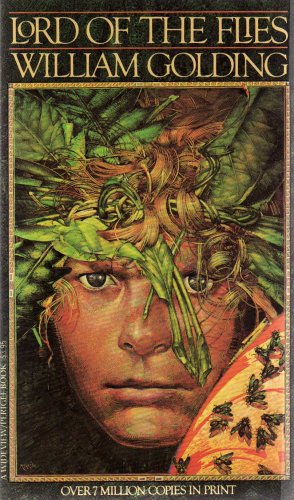All Nonfiction
- Bullying
- Books
- Academic
- Author Interviews
- Celebrity interviews
- College Articles
- College Essays
- Educator of the Year
- Heroes
- Interviews
- Memoir
- Personal Experience
- Sports
- Travel & Culture
All Opinions
- Bullying
- Current Events / Politics
- Discrimination
- Drugs / Alcohol / Smoking
- Entertainment / Celebrities
- Environment
- Love / Relationships
- Movies / Music / TV
- Pop Culture / Trends
- School / College
- Social Issues / Civics
- Spirituality / Religion
- Sports / Hobbies
All Hot Topics
- Bullying
- Community Service
- Environment
- Health
- Letters to the Editor
- Pride & Prejudice
- What Matters
- Back
Summer Guide
- Program Links
- Program Reviews
- Back
College Guide
- College Links
- College Reviews
- College Essays
- College Articles
- Back
Lord of the Flies
“Is evil influenced from other sources, or is it merely a force which wells from within an individual?” This is a curious question raised by author William Golding. Through his novel, Lord of the Flies, he conducts an imaginary experiment to test his curiosity involving British schoolboys and the society they create on their own without any influence from an existing society. Unfortunately, the negative conclusion of his experiment confirms that evil is indeed a seed which exists in every being. Everyone possesses the potential to harvest this seed and allow it to blossom into catastrophe. Evil exists wherever man exists. This conclusion is discovered by Simon, a boy whose intelligence is scorned by the other boys on the island. As the novel unfolds, it portrays Simon as a character with a discreet personality, astounding intellect, and qualities which depict saint-like symbolism.
Simon’s cautiousness obstructs him from asserting his view on the question many of the other boys share concerning the existence of the “beast”. In his eyes, to speak before an assembly requires the courage equivalent to wrestling with sharks. When he summons the courage to express his belief, the boys immediately reject his ideas. This blow of rejection leaves Simon with a crushing feeling of self-cautiousness. The apparent unworthiness of his opinion causes him to shrink and keep to himself. Even though his ideas and beliefs may benefit the boys’ chances of survival on the island, his ability to publish his words is restrained by his shy nature. Simon does not associate with other inhabitants on the island unless it is critical. In the meantime, he retreats to his secluded place in the forest. This peaceful sojourn allows him to organize his thoughts and question the continual existence of the island's beastly inhabitants.
Simon displays great intellect in a way distinct from the other boys. Piggy, another inhabitant of the island, bases his knowledge on fact and logical reasoning. Simon’s intellect burrows deeper than that of mere statistics. He extracts his knowledge from deep within the core of his being through illusion. After the notorious pig massacre, he realizes that evil does not exist as an outside being that can live and be put to death, but as a force which exists in the depths of all human beings. This enlightment of discovery is sought through a disturbing vision Simon beholds. A pig’s head on a spear declaring itself the “Lord of the Flies” grants Simon the knowledge he has been yearning for. He perceives the pig head as an outlet to plug in his flashing realizations. His refuge in the forest reveals to the reader that Simon wholeheartedly believes there is nothing to fear in the forest. Fear does not dwell in the bowels of the forest or flitter on the sunny beach. No place is secure from “beast” within the boys.
Symbols in the novel depict Simon as a saintly figure. Like the sacrificial pig, Simon’s murder is due to the misunderstanding of the beast’s existence. After the spill of his innocent blood, phosphorescence from the ocean gathers around his head and fashions a halo-like garland. Simon’s role in the novel is similar to the role of an earth-angel. He is gifted with the knowledge to maintain civility and peace on the island, but only those who have pure open minds are worthy to receive it. Unfortunately, the boys on the island ignore the cry of the angel and fail to receive his gift. Returning to Simon’s sanctuary in the forest, note that it is not a place where darkness resides. The forest in the novel represents evil and savagery. Simon’s place is radiated with sunlight, a symbol of goodness. The contrast of this opening represents a heavenly, spiritual refuge. It represents an angel’s sanctuary.
A timid disposition, wondrous intellect, and saintly qualities are characteristics that make Simon such an impact on the novel. He presents the ultimate definition of evil’s existence in a way which can be comprehended. His death symbolizes the destruction of mankind and the extremities of human nature. His knowledge contributes to the turning point if the novel and the true identity of the “beast”. Readers for years to come will conclude from Simon and the Lord of the Flies the origin of evils in society.
Similar Articles
JOIN THE DISCUSSION
This article has 0 comments.

